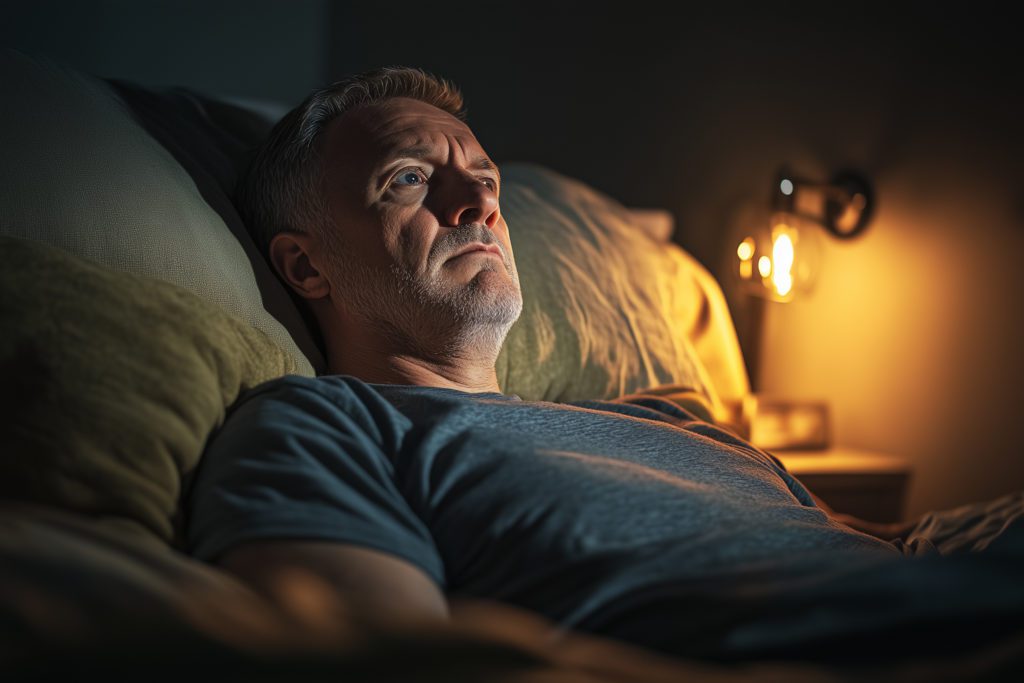
The Causes of Sleep Talking: From Stress To Sleep Disorders
Sleep talking is a common sleep phenomenon among children and adults. Understand the links between sleep talking and sleep disorders and when to seek help.

Has your partner told you that you talk in your sleep? Wondering what it means? Sleep talking (also known as somniloquy) is a relatively common sleep disorder that is characterized by unintentional vocalizations while sleeping. It is a type of parasomnia and, like teeth grinding or sleepwalking, is usually uncontrollable.
While sleep talking can occur after a particularly eventful day, it may also be associated with more serious conditions like sleep apnea, chronic headaches, emotional stress or nightmares. Here’s what you need to know.
Why Does Sleep Talking Occur?
Although the reasons behind sleep talking are not entirely understood, there are some common factors in most cases:
- Alcohol or substance use
- Certain mental health conditions (anxiety, depression or PTSD)
- Sleep deprivation
- Fever or illness
- Certain medications (sedatives, benzodiazepines or hypnotic agents)
- Emotional stress
- Jet lag
- Sleep disorders
In addition, there seems to be a genetic factor associated with sleep talking. Children who frequently sleep talk have a parent who did the same as a child or continues to do so. Other common factors may include REM sleep behavior disorder, sleep terrors and teeth grinding.
What Are Some of the Symptoms Associated With Sleep Talking?
The main symptom associated with sleep talking is speaking out loud while sleeping without being aware of it occurring. Vocalizations may range from pure gibberish to coherent speech. Half of sleep talking tends to sound more like mumbling. Some people may move their lips without saying much at all. Others who sleep talk sound fully comprehendible and speak as though conversing with another person. They may speak in complete sentences and even naturally pause as though they were chatting with someone else. Some people make negative or profane statements. Regardless of what is said, these episodes are often short and may involve only a handful of sentences or words.
The Link Between Sleep Talking and Sleep Disorders
While sleep talking is not inherently dangerous and does not require treatment, it may be indicative of a potential sleep disorder. Sleep talking is sometimes seen in the following sleep disorders:
- REM sleep behavior disorder
- Sleep terrors
Sleepwalking - Nightmare disorder
- Nocturnal sleep-related eating disorder
- Obstructive sleep apnea
While sleep talking in itself does not mean you have a sleep disorder, it can be an indicator of something more serious.
How Common Is Sleep Talking?
Sleep talking is one of the most common sleep issues, with up to 66% of adults experiencing it in their lifetimes. However, it does not occur frequently. You may occasionally talk in your sleep, and bouts of insomnia or stress may be to blame. Sleep talking is more common in children than adults. Because people are unaware of these events, it often goes unnoticed, especially if they sleep alone. Reports of sleep talking most often come from a bed partner or close family member.
How To Stop Sleep Talking
The underlying causes of sleep talking are not fully understood. Therefore, there is very little knowledge regarding proven methods to quit. For most people, sleep talking occurs so infrequently that treatment is unnecessary. However, if you frequently talk in your sleep and want to stop, you may want to focus on improving your sleep hygiene. Some ways to enhance your quality of sleep include:
- Keeping a consistent bedtime, even during the weekends
- Avoiding caffeine and other stimulants before bed
- Reduce or eliminate alcohol use
- Allowing yourself time to relax before bedtime
- Placing your electronic devices on Sleep Focus (iOS) or
- Sleep Mode (Android)
- Track your sleep with Pillow to make sure you are getting enough Zzzs
- Getting plenty of physical exercise during the day
- Creating a distraction-free bedroom that's comfortably cool
- Investing in a comfortable mattress, bedding and pillows
Because talking in your sleep often occurs during times of emotional or physical stress, it is essential to take care of your mental well-being. Cognitive behavioral therapy (CBT) can be especially helpful if mental health issues are triggering sleep talking.
You can apply the above tips and make adjustments as necessary until you find a solution that works for you. Sometimes, improving your sleep hygiene is all you need to eliminate problematic patterns so you and your bed partner can enjoy restorative slumber without interruptions.
How To Know When It's Time To See a Doctor
While most people do not need to visit a doctor if they experience occasional sleep talking, there may be some situations in which you may want to consider seeking medical guidance:
- If what you say while you sleep talk is causing embarrassment or awkwardness with your bed partner
- If you continuously interrupt your bed partner with sleep talking and they find it challenging to get adequate rest
- If your sleep talking occurs alongside other symptoms like sleepwalking, violent movements or vivid nightmares
In some instances, sleep talking may negatively affect your relationship with your partner, especially if your sleep talking interferes with their ability to rest. By making an appointment with your doctor, they may refer you to a sleep specialist to get to the root of your issue. They may ask you about your medical history and how long you've been experiencing your symptoms and gather other important information surrounding your sleep habits.
Although no tests are necessary to diagnose sleep talking, your specialist may order a sleep study or recording if there are indications of another underlying sleep disorder. Your doctor may also refer you to a therapist or mental health professional to discuss any mental health concerns.
Don’t Let Sleep Talking Keep You From Sleeping Soundly
While talking in your sleep is mostly harmless and rarely requires treatment, frequent occurrences combined with other factors may be the result of another more serious health condition like epilepsy or sleep apnea. That’s why it’s so important to schedule an appointment with your doctor if you talk in your sleep frequently. That way, you can address your concerns and find practical solutions to help you get a good night's sleep.
FAQ
Is sleep talking hereditary?
Studies suggest that sleep talking has a genetic component, with individuals having a family history of parasomnias being more prone to it. While genes play a role, environmental factors such as stress and sleep habits can also influence sleep talking frequency and intensity.
Can sleep talking reveal hidden thoughts or secrets?
Sleep talking is typically random and nonsensical, as it arises from brain activity during different sleep stages. It’s unlikely to reflect true thoughts, feelings, or memories. Most phrases are fragmented and unrelated to conscious experiences, making it unreliable for revealing secrets
Does sleep talking affect sleep quality?
In most cases, sleep talking does not significantly impact sleep quality for the person experiencing it. However, if it’s frequent and accompanied by other sleep disturbances, it could indicate underlying issues such as stress, sleep apnea, or parasomnia disorders that may affect restfulness.
Are there any medications that can help reduce sleep talking?
There is no specific medication to stop sleep talking, but addressing underlying conditions like anxiety or sleep disorders with prescribed treatments, such as melatonin supplements or anxiety medication, can help manage symptoms and improve overall sleep health.
Can sleep talking be triggered by environmental factors?
Yes, environmental factors like noise, temperature changes, or an uncomfortable sleeping environment can contribute to sleep disruptions that lead to sleep talking. Establishing a calm, quiet, and consistent sleep environment may help reduce occurrences.
Does alcohol consumption increase the likelihood of sleep talking?
Yes, alcohol disrupts sleep cycles, particularly REM sleep, leading to more fragmented sleep and increased sleep talking episodes. Reducing alcohol intake before bedtime can help improve sleep quality and decrease the likelihood of sleep disturbances.
Can recording devices or sleep tracking apps help diagnose sleep talking?
Yes, sleep tracking apps and audio recordings can help monitor sleep talking frequency and patterns. These tools provide insights into sleep quality and can help healthcare providers determine if further evaluation for sleep disorders is needed.

Written by
Emily Mendez
Emily Mendez is a former therapist and mental health author. She is one of the leading voices in mental health. Emily's writing has appeared in eCounseling, SonderMind, and more. Emily is frequently interviewed by Healthline, Fatherly, INSIDER, Family Circle, and other national media for her advice and expert opinion on the latest mental health topics.
Download Pillow
Get help
Press & News
Legal
Connect
X (Twitter)
Company
Copyright © Neybox Digital Ltd.



